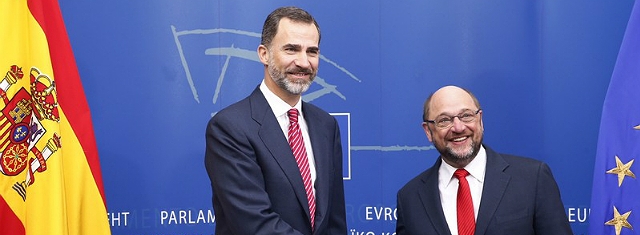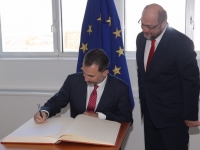Politics
The King of Spain visits the European institutions
First official visit as King

King Philip VI and Martin Schulz (Source: EP Press services)
USPA NEWS -
The King of Spain, Philip VI, visited this Wednesday April 15 the European institutions, first official visit as King. Philip VI started the day visiting the European Parliament. Upon arrival at Paul Henri Spaak building, the King was received by the President of the EP, Martin Schulz.
After signing the King in the book of honor of the institution, Philip VI and President Schulz were accompanied by their respective delegations. Once this meeting, the Spanish King and the President of Parliament, along with their respective delegations, held a meeting with representatives of political groups in the European Parliament. Once completed, His Majesty the King meet with Spanish MEPs.
Philip VI activities in Brussels continue with meetings with the President of the European Council, Donald Tusk, and President of the European Commission, Jean-Claude Juncker. Finally, His Majesty King maintained a lunch with members of the College. The three main institutions of the European Union are the European Parliament, which represents the EU citizens and is directly elected by them; the Council of the European Union, which represents the governments of each of the Member States -the Member States share the Presidency of the Council regularly-, and the European Commission, which represents the interests of the Union as a whole.
Together, the three institutions produced by the "ordinary legislative procedure", policies and laws that apply throughout the EU. In principle, the Commission proposes new laws, and Parliament and the Council adopt them. Next, the Commission and the Member States implement this legislation and the Commission ensures that the laws are enforced correctly.
Two other institutions that play important functions are the Court, which monitors compliance with European law, and the Court of Auditors, which controls the financing of EU activities. The powers and responsibilities of these institutions are laid down in the Treaties, which are the basis of all EU activities. The treaties also establish standards and procedures to be followed by EU institutions. Are agreed by the Heads of State or Government of all EU countries and ratified by their parliaments.
Liability for this article lies with the author, who also holds the copyright. Editorial content from USPA may be quoted on other websites as long as the quote comprises no more than 5% of the entire text, is marked as such and the source is named (via hyperlink).






